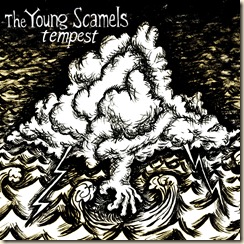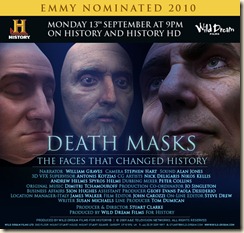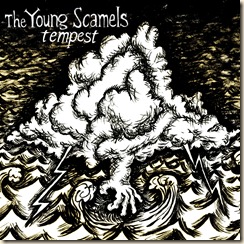 From the press release: The Young Scamels "Tempest" continues a collaboration that has been going for almost 20 years. The album was written by Christian Frederickson, Greg King and Jason Noble (who have performed together in the Rachel’s band and Shipping News). When they were offered a chance to score "The Tempest" at Actors Theatre of Louisville in 2007/2008 they jumped at the chance. Opening with the softly layered violas of "Bring Forth a Wonder" the album shifts into the unkempt "Tempest" – finding the band resorting to hitting scuba tanks and going for a Peter Gabriel-tribute drum sound. Next is "Full Fathom Five", the first of several tracks with Shakespeare’s words, using more electric guitar, keys and a dissonant vocal cloud and bruised melody. As the album progresses, the quiet "I’ll Drown My Book" moves on to haunted landscapes of bells and synths, light-hearted beats, viola, vibes and guitar. The closing track, "A Contract of True Love," brings the many characters together in a final celebration, forgiveness being offered to all while strident drums, multiple voices and strings bang out an upbeat farewell message. The album is coming out on September 21st via File 13 Records.
From the press release: The Young Scamels "Tempest" continues a collaboration that has been going for almost 20 years. The album was written by Christian Frederickson, Greg King and Jason Noble (who have performed together in the Rachel’s band and Shipping News). When they were offered a chance to score "The Tempest" at Actors Theatre of Louisville in 2007/2008 they jumped at the chance. Opening with the softly layered violas of "Bring Forth a Wonder" the album shifts into the unkempt "Tempest" – finding the band resorting to hitting scuba tanks and going for a Peter Gabriel-tribute drum sound. Next is "Full Fathom Five", the first of several tracks with Shakespeare’s words, using more electric guitar, keys and a dissonant vocal cloud and bruised melody. As the album progresses, the quiet "I’ll Drown My Book" moves on to haunted landscapes of bells and synths, light-hearted beats, viola, vibes and guitar. The closing track, "A Contract of True Love," brings the many characters together in a final celebration, forgiveness being offered to all while strident drums, multiple voices and strings bang out an upbeat farewell message. The album is coming out on September 21st via File 13 Records.
From Duane: I’m listening now, and I have to say I quite like the “Full Fathom Five” single. Nice strong female lead. I was not crazy about “Be Not Afeard,” which ends up as more of a spoken word piece. Some of the others are very slow, and mostly instrumental as the press release notes. I’ve not yet been through them all. Always fun to see what people do when putting Shakespeare’s words to music. You can’t really explain it, you have to hear for yourself and decide if it’s your cup of tea.
Month: September 2010
Shakespeare Versus The Goblins : A Review of “Will Power”
A funny thing happened on the way to this review. I got email from Tor books, who are known in the scifi/fantasy world. So I thought it was a press release and didn’t really pay attention – until I noticed that Shakespeare was mentioned. Then I realized it wasn’t a mass mailing, it was addressed directly to me at my Shakespeare Geek address. Turns out that this particular book was written by a Shakespeare professor and they thought I might like a review copy. Sure! Will Power is the second in a series from author A.J. Hartley, Distinguished Professor of Shakespeare at the University of North Carolina. I felt a little weird jumping into the series in the middle, but really if you think about the fantasy genre the odds are against you on that one (for any N book series, you’ve got an N-1 out of N chance of finding a book other than book 1). This book tells the continuing story of our merry band of adventurers, including one Will Hawthorne, playwright. You know the type – generally cowardly sort who only came along to hang out on the sidelines and partake of the treasure, and maybe some beer and wenches. And, naturally, he’s the one who inevitably saves his stronger and braver friends when they get into trouble. In Will Power, it doesn’t take long before the group is mysteriously transported into a strange new land, and split up in the process. They soon find themselves unwelcome guests right in the middle of a war between the Fair Folk and the Goblins. But is all as it seems? His companions Orgos and Mithos have been captured by goblins, Renthrette and Garnet have joined the Fair Folk, Lisha is lost somewhere, and something just doesn’t feel right to Hawthorne. What happens next? There are enough twists and turns and clever devices that I can honestly say I didn’t predict where the story would go. The story ends on a satisfactory note while simultaneously opening up a door for the next book in the series. This author knows how to write fantasy. 🙂 What about the Shakespeare, you’re asking? Me too. There’s a funny scene early on when Hawthorne stumbles across what he thinks is a tavern, and introduces himself by reciting something of a mini-ballad … in iambic pentameter. Not bad. Later, while roaming around the city of the Fair Folk, we learn that they have a library, and that library has a drama section. Hawthorne makes a beeline for this literary oasis, breaking down doors (seriously) to get to it. I think some of the literature geeks in the audience can appreciate what that feels like. There may be a goblin war raging outside the city walls, but if you need me I’ll be curled up with a good book. There are also plenty of opportunities to do the whole “act like somebody you’re not” thing for our hero. He has to act like he knows what he’s doing half the time, after all. But none of that is really Shakespeare. Nobody “puts on a show.” The press release suggests “a magical world which very closely resembles that of the Elizabethan Era,” and I’m wondering if that was a comment from the first book. Because other than starting the book out in a tavern and making regular comments about the poor quality of the beer, I can’t really see where the Elizabethan thing comes in. Oh, well, I take that back – the city of the Fair Folk is populated with courtiers who spend their days drenching each other in over-the-top metaphor (“My Lord, embers and smoldering leaves produce a smoke most bitter and unwholesome to the senses, yet the heat from whence it rises is but a poor and mean thing at which one might not even warm one’s hands. The heart of a furnace burns pure and hot, consuming all and leaving little there to smoke withal. So my love for Johanna, like the core of the forge, blazes with white, undying passion, while yours for Beatrice, I fear, so cool and, doused with overlong laments, smokes merely.”) I always thought this behavior was more Victorian than Elizabethan, but I’m not a history buff. What it reminded me of was a Monty Python version of Oscar Wilde. It did not go unnoticed, either, that the author drops in names like Beatrice as necessary – one of the others tells the story of a young lady enamored with a certain young shepard named Corin, as well. Both are direct, if insubstantial, Shakespeare references. Will Power was an entertaining fantasy book. I may have started out assuming that it was going to fit the standard form where the ‘weakling’ in an otherwise stalwart band of adventurers eventually turns out to save the day, but in the end there was enough originality that I was impressed with how it all went down. I would have liked more Shakespeare, but that’s not a fair measure – I always want more Shakespeare, up to the point where it *is* Shakespeare. :) I’ll be curious to see how the third book goes, and how much Shakespeare comes into it.
The Flower Portrait Might Be Genuine After All
[The following comes from a press release that was sent to me directly by Professor Dr. Hildegaard Hammerschmidt-Hummel herself.] In her book The True Face of William Shakespeare. The Poet’s Death Mask and Likenesses from Three Periods of His Life (2006) Prof. Hammerschmidt- Hummel was able to prove the authenticity of the Chandos and Flower portraits, the Davenant bust and the Darmstadt Shakespeare death mask – in close collaboration with forensics experts from the BKA, the equivalent of the CID, several medics, physicists, 3D and other specialists. 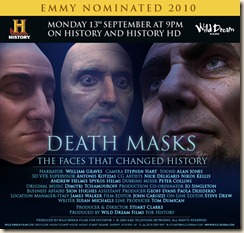 When Dr Tarnya Cooper, a curator at the National Portrait Gallery in London, cast doubt on the authenticity of the Flower portrait, Hammerschmidt- Hummel undertook a renewed comprehensive investigation of this portrait, once again involving an array of international experts. A joint inspection of the painting in the Royal Shakespeare Company’s depository in Stratford- upon-Avon, and the analysis of the BBC film ”The Flower Portrait”, demonstrate strong powers of observation and a thorough multidisciplinary approach, which lead to new – completely unexpected – results and make for a suspenseful read. These new results will be introduced and explained by Hammerschmidt- Hummel at the book presentation on 28 September 2010. The author will also briefly comment on the 3D recreation of the Darmstadt Shakespeare death mask in the film “Death Masks” broadcast in the UK on 13 September 2010 on HISTORY. And the Flower Portrait of William Shakespeare is Genuine After All. Latest Investigations Again Prove its Authenticity. Translated from the German by Professor Alan Bance (Hildesheim: Georg Olms Verlag, 2010) will be presented to the public at the University of Mainz on 28 September 2010, 6:00 pm, on the campus of Johannes Gutenberg University, Building: ‘Philosophicum’, Room P 13, Jakob-Welder-Weg 18. The speakers are: Univ.-Prof. Dr. Mechthild Dreyer, Vice President Prof. Dr. Jürgen Oldenstein, former Vice President Univ.-Prof. Dr. Ulrich Breuer, Dean of FB 05 – Philosophy and Philology Prof. Dr. Hildegard Hammerschmidt-Hummel Dr. Annette Holzapfel-Pschorn
When Dr Tarnya Cooper, a curator at the National Portrait Gallery in London, cast doubt on the authenticity of the Flower portrait, Hammerschmidt- Hummel undertook a renewed comprehensive investigation of this portrait, once again involving an array of international experts. A joint inspection of the painting in the Royal Shakespeare Company’s depository in Stratford- upon-Avon, and the analysis of the BBC film ”The Flower Portrait”, demonstrate strong powers of observation and a thorough multidisciplinary approach, which lead to new – completely unexpected – results and make for a suspenseful read. These new results will be introduced and explained by Hammerschmidt- Hummel at the book presentation on 28 September 2010. The author will also briefly comment on the 3D recreation of the Darmstadt Shakespeare death mask in the film “Death Masks” broadcast in the UK on 13 September 2010 on HISTORY. And the Flower Portrait of William Shakespeare is Genuine After All. Latest Investigations Again Prove its Authenticity. Translated from the German by Professor Alan Bance (Hildesheim: Georg Olms Verlag, 2010) will be presented to the public at the University of Mainz on 28 September 2010, 6:00 pm, on the campus of Johannes Gutenberg University, Building: ‘Philosophicum’, Room P 13, Jakob-Welder-Weg 18. The speakers are: Univ.-Prof. Dr. Mechthild Dreyer, Vice President Prof. Dr. Jürgen Oldenstein, former Vice President Univ.-Prof. Dr. Ulrich Breuer, Dean of FB 05 – Philosophy and Philology Prof. Dr. Hildegard Hammerschmidt-Hummel Dr. Annette Holzapfel-Pschorn
Toward A More Open Open Mic Night
So I went to an Open Mic Shakespeare night this weekend, and am currently having a discussion with one of the organizers (who is aware that I’m posting this). I mentioned to him that, from my position in the audience, it looked like a bunch of somewhat professional theatre folk putting on a show, with little room for anything that could be considered “open”. He countered that on the contrary, all his group had done was to schedule in a couple of anchoring acts throughout the night, and everything else that I’d seen was indeed people coming in on their own, often with pieces prepared but sometimes just reading from the notes provided. Which brought up the question of how exactly might you want an open mic night to go, if you’re the theatre company putting it on? If you set the bar very high by having “real” (forgive the terminology, it’s not correct to say “professional” and I can’t think of a better word) actors do many of the selections then it will be entertaining for the audience, but then that’s not really open in the sense that people might have come expecting. On the other hand if you truly just opened up the mic and had nothing but a stream of people who’d possibly never done it before, then you’d be open enough but people listening might find it the opposite of entertaining. (Just imagine an open mic night at the comedy club, and how bad a comedian can truly be, then apply that to Shakespeare). My worst fear isn’t people who try, and aren’t good. My worst fear is people who *think* they are good, and aren’t. (I’m reminded of a line from the tv show Scrubs about karaoke where one character says, “I dunno, I’m pretty particular about my karaoke. I do these kick moves that I don’t think people really get? And sometimes I like to wear a cape.”) What would you do? How do you strike the balance? I’ve only been to two of these events, but I’m an interesting case. I have some Shakespeare memorized, and if somebody stuck a microphone in my hand I’d give it a shot. I’d actually be happy and excited to give it a shot. But if you say “There’s a clipboard in the back, just sign your name” then I become glued to my seat, assuming that the list is already a mile long, signed by people who show up every Friday night to perform the same well-rehearsed bits that they do at every event. So tell me, geeks. Have you been to these events? Do you like them? How did they go? Is there room for first timers? How could they be done better? What’s the real goal – to give amateurs a chance at the microphone that they might not normally get, or is it to entertain the audience? What happens when the two are mutually exclusive, how do you strike the balance? Feel free to answer any combination of the above. 🙂
Shakespeare Toasts: Get Inspired with Quotes from the Bard
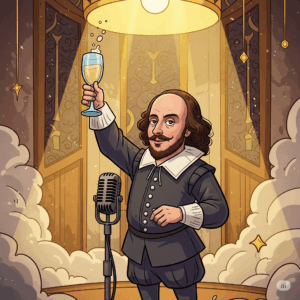
Have you ever found yourself in a situation where you needed to give a toast but had no idea what to say? You can’t go wrong with Shakespeare toasts. Here are a few lines from Shakespeare to keep in your back pocket (figuratively, by memorizing them, or have them written on a card in your back pocket :)) to help you out.
Set It Up
“Shakespeare said.” Remember those words. It may be more accurate to say that Duke Orsino said it in Twelfth Night, but most of your audience will typically not get that. Everyone in the crowd, however, is guaranteed to recognize the name Shakespeare and pay attention to what you’re about to say. Of course, you can phrase it however you like. “As Shakespeare once said…” or “In his romantic comedy Twelfth Night, William Shakespeare wrote….” You get the idea. That’s just a matter of style. Below, each quote cites the character who said it, the play, and the act/scene where it can be found, in case you want to work this information into your Shakespeare toasts.
Openers / Ice-breakers for Shakespeare Toasts
“Men of few words are the best men.”
[Boy, Henry V. Act 3, Scene 2]
“…so, I’ll keep it brief.” Or, if you prefer the self-deprecating style, “Shakespeare said that men of few words are best men. I guess that doesn’t say much for me because I’ve got about 20 index cards of notes to get through.”
“Brevity is the soul of wit.”
[Polonius, Hamlet. Act 2, Scene 2]
This line serves the same general purpose as the one above if you like it better. It’s the more popular quote, so your audience may recognize it. That may make it too cliché for you, though. Judgment call.
“Though I am not naturally honest, I am sometimes by chance.”
[Autolycus, The Winter’s Tale. Act 4, Scene 4]
On the other hand, not too many people will recognize the source of this quote. But hopefully, they get the joke – that you lie so often that when you do tell the truth, it’s probably a mistake. You can then go on to say whatever complimentary words you like and leave them wondering whether or not you meant any of it!
“Better a witty fool than a foolish wit.”
[Feste, Twelfth Night, Act 1, Scene 5]
If you were worried that dropping some Shakespeare into your toast would make you feel silly, here’s your out. Everybody knows the expression “better to have them laughing with you than at you,” this is just Shakespeare’s version. You can try to say something smart and end up sounding ridiculous, or you can start by setting the expectation that you might say something ridiculous, and leaving everyone pleasantly surprised.
“All the world’s a stage, and all the men and women merely players.”
Jaques, As You Like It, Act 2, Scene 7
This is one of your great “everybody will recognize this one” Shakespeare toasts, so it’s a sure bet to get people’s attention. Of course, what you follow it up with is up to you. It literally sets the stage for whatever sentiment you want to convey. You can carry it through with more of the speech, too, if you want:
They have their exits and their entrances;
And one man in his time plays many parts.
The perfect set up for any significant life event – a graduation, a new job … even a wedding. Life is all about change, and Shakespeare toasts are always appropriate.
Best Wishes
There are plenty of ways to say “Best Wishes” in the works of Shakespeare. Here are but a few.
“Your heart’s desires be with you.”
[Celia, As You Like It. Act 1, Scene 2]“Lack nothing: be merry.”
[Shallow, Henry IVp2. Act 5, Scene 3]
“All days of glory, joy and happiness.”
[Lewis, King John. Act 3, Scene 4]
“Fair thought and happy hours attend you.”
[Lorenzo, Merchant of Venice. Act 3, Scene 4]
“I wish you all the joy you can wish.”
[Gratiano, Merchant of Venice. Act 3, Scene 2]
This one’s a personal favorite. It’s modern enough that it doesn’t feel like Shakespeare, and generic enough that it can fit any occasion. I write it on a lot of cards, but it’s even more powerful when you get to look someone in the eye and say it.
“Heaven give you many, many merry days.”
[Mistress Page, Merry Wives of Windsor. Act 5, Scene 5]
“Heaven send thee good fortune.”
[Mistress Quickly, Merry Wives of Windsor. Act 3, Scene 4]
Wrap It Up
“I drink to the general joy of the whole table.”
[Macbeth, Macbeth. Act 3, scene 4]
Shakespeare toasts are just a way of getting between the guests and their drinks, so the less you talk, the better. People also love knowing when it’s over, so they’ve got permission to get back to drinking. Use this line as your closer, drink, and sit down.
In conclusion, Shakespeare toasts offer a delightful way to add depth, eloquence, and a touch of literary charm to any celebration. By drawing inspiration from the works of William Shakespeare, you can craft memorable toasts that resonate with your audience and leave a lasting impression. Whether it’s a wedding, anniversary, or simply a gathering of friends, incorporating Shakespeare’s timeless words elevates the art of toasting, creating moments of connection, celebration, and appreciation. So, raise your glasses and let the Bard’s words inspire your next heartfelt and captivating toast, making your special occasions truly unforgettable. Cheers to the power of Shakespearean toasts!
Based on material from the book Hear My Soul Speak: Wedding Quotations from Shakespeare, now available on Amazon! The definitive guide to Shakespeare toasts, wedding quotes, and readings.

